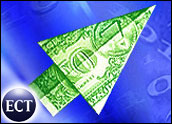
With tax rebate checks from the U.S. government beginning to arrive in consumer mailboxes, some e-tailers are hoping the extra cash will make its way to their bottom lines.
According to many industry experts, however, online businesses should not head for the bank quite yet. Due to the nominal amount of the rebate checks, few analysts suggest that the rebate money will produce a significant online windfall.
Other experts point to the precarious state of the U.S. economy and say that the rebate money is likely to go directly to savings and debt-paying, rather than into the retail sector.
Dr. Vijay Kanabar, associate professor of computer science and e-commerce at Boston University, sees the tax rebate checks as negligible economic drivers at best.
“We have a $10 trillion economy,” Kanabar told the E-Commerce Times. “The tax cut is a drop in the bucket.”
According to Peter Navarro, associate professor of business and government at the University of California-Irvine, “the problem now is that people are uncertain about where we are going, so they are likely to sock the rebate money away in savings.”
Home Deposit?
Home Depot (NYSE: HD) is one retailer trying to capture some of President George W. Bush’s good tidings, calling out to its online shoppers with the promotion, “Why wait on your tax rebate check? Shop online now.”
Home Depot is eyeing the $38 billion in tax rebates that U.S. taxpayers began receiving in July, per order of the Economic Growth and Tax Relief Reconciliation Act of 2001 that was signed by Bush on June 7th. Single taxpayers are receiving a maximum of $300, heads of households $500, and married couples filing jointly $600.
In June, Home Depot commissioned an independent survey to determine what homeowners were likely to do with their rebate checks. The survey revealed that after using the funds to pay bills and taxes, homeowners would rather put the money towards home improvement projects rather than savings, vacations, new clothing or electronics. In fact, 30 percent of respondents would invest in their homes, according to the survey.
Clicks Resemble Bricks
Home Depot spokesperson Don Harrison told the E-Commerce Times that the “Why wait” campaign was just phase one of Home Depot’s efforts to lure shoppers. The company will soon offer check-cashing services, so consumers can apply their rebates toward in-store or online purchases.
While much of Home Depot’s sales are currently in-store, recent studies indicate that online retail spending patterns are beginning to mirror offline patterns. Greenfield Online, an Internet-powered market research firm, has noticed this trend in its online spending study, the Digital Consumer Shopping Index.
Greenfield spokesperson Gail Janensch told the E-Commerce Times that the last 12 quarters of data illustrate strong parallels between online and offline retailing trends.
No Remedy
Forrester research director James McQuivey said that given the current slump in online as well as offline retail spending, no spike resulting from marketing efforts like those of Home Depot will register as sector growth.
“We might normally expect some convenience purchases to increase, like books, music and apparel, since folks will have extra cash in their pockets,” McQuivey told the E-Commerce Times. “However, given that those categories have all declined as of late, any lift that a specific category experiences will feel like a reprieve, not genuine growth.”
Although Bush’s tax program is designed to cut taxes by about $1.6 trillion over 10 years by reducing marginal tax rates, this year’s rebate check will be the only one-time influx of cash in consumers’ wallets.
“The tax cuts are designed to forestall any further decline in the economy,” said McQuivey. “Their biggest contribution will be to sustain current online spending, rather than driving it back up.”
Travel, By George
Boston University’s Kanabar suggested that some consumers might make travel plans with their rebate checks in hand, searching for bargains from online vendors like Travelocity and Expedia.
Honolulu, Hawaii-based travel store Cheap Tickets (Nasdaq: CTIX) is one e-tailer banking on Kanabar’s suggestion.
On July 22nd, just before the first batch of rebate checks arrived on American doorsteps, Cheap Tickets launched an e-mail campaign, greeting consumers with, “By George … we’ve got it! The perfect way to say ‘Thanks, George’ for your tax-rebate check is on a Fall vacation.”
The company’s “Thanks, George” specials are priced $300 or less, and purport to “make spending that rebate downright patriotic.”
Greenspan Holds Cards
Regardless of the success or failure of individual e-tailer marketing efforts, it is highly likely that any resuscitating effect that Bush’s tax program might have on the U.S. economy will not be felt for many months.
Kanabar said that an interest rate cut by the Federal Reserve would go much further and quicker towards spurring online and offline retail spending than the tax cut will.
“As is often the case, good politics was bad economics,” added Navarro. ![]()


























































Social Media
See all Social Media